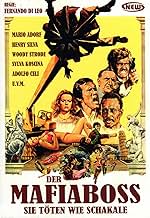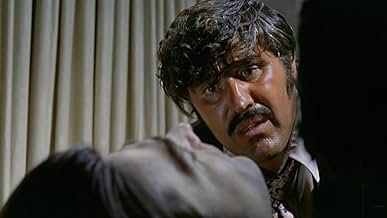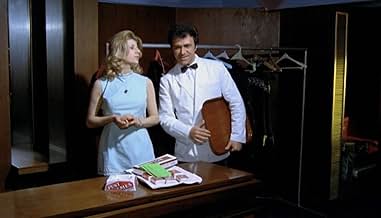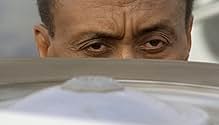IMDb RATING
7.1/10
3.1K
YOUR RATING
A Milanese pimp is pursued by - and then pursues - a pair of New York hitmen and the gangsters who framed him for stealing a shipment of heroin.A Milanese pimp is pursued by - and then pursues - a pair of New York hitmen and the gangsters who framed him for stealing a shipment of heroin.A Milanese pimp is pursued by - and then pursues - a pair of New York hitmen and the gangsters who framed him for stealing a shipment of heroin.
Featured reviews
I spent much time in studying Italian police films of this era - and this one sticks out as one of the best. Unlike other Di Leo flicks - this one has a decent story, features B+ actors like Mario Adorf and Adolfo Celli (Mr. Largo in OO7's Thunderball), the editing is fast and rhythmic and it contains only one car chase but this one has it. The films owes its quality largely to the German-Italian actor Mario Adorf (already playing in one other Di Leo Film "Milano Calibro 9") - Adorf is witty, has a face with a thousand expressions and perfectly impersonates the change of small-town-pimp into a revenge-driven killing machine - without overdoing it. Unlike other films of this genre this one is tightly bound by a reasonable script, logical development of the characters and a rough, greasy camera-style. Editing is superb in timing, no frame is wasted for stupid dialogues or the typical 70ies mood shots (you see a scenery with someone walking and nothing happens). This film is perfect for exploring this genre.
Now released under the absurdly named Mack Video as the absurdly named BLACK KINGPIN, LA MALA ORDINA, once known as MANHUNT, shows the Italian seventies policier director Fernando DiLeo in peak form. The Italian cops-mob-and-corruption movies often had a neorealist tincture, not far from such British cousins as GET CARTER or THE LONG GOOD FRIDAY. (The best in this vein is the dark, harrowing VIOLENT NAPLES.) But some of them were as ripe and over-the-top as concurrent works of Italian horror; and this saga of a small-town pimp pursued, God knows why, by Mr. Big and two Vincent-and-Jules-looking U.S.-made button men, looks like the product of some torrid motel-room coitus between Sergio Leone and Don Siegel. The faces are sweaty, the beatings (to evoke Roger Ebert's memorable phrase) suggest the sound of ping-pong paddles smacking naugahyde sofas--the only thing that's missing is the groan of an Ennio Morricone score. An evening of Shane Black quips it ain't, but ninety minutes of top-shelf hardboiled groove it is.
"Manhunt" is a fantastic title for a fantastic Italian action/thriller with even more fantastic testosterone-laden characters and a fantastically dazzling level of excitement. Admittedly I'm slightly biased, as I'm a sucker for Italian cult cinema in general, but hey, apparently so are all my fellow reviewers around here! The second installment in Fernando Di Leo's Italian mafia trilogy is definitely on par with the other two, "Milano Calibro .9" and "The Boss", and I rated those respectively 10/10 and 9/10. The three films take place in similar locations and often even star the same cast members, but nonetheless they're entirely divergent and distinctly unique achievements. "Manhunt" mainly excels through a vastly simplistic yet hugely fascinating plot, but also through a handful of jaw-dropping shock sequences and perplexing performances. Two relentless American hit men arrive in Milan with the assignment to eliminate the guy who was supposedly responsible for a shipment of heroin gone missing. Basically a routine job, but the boss wants to set an example out of this case and instructs for the kill to be mighty and spectacular. One problem, however, the target Luca Canali is only a small time pimp wrongfully appointed as the culprit by the competition and he unexpectedly safeguards himself tremendously from the massive manhunt held against him. Mega-gifted director Di Leo masterfully illustrates the titular manhunt, as we gradually witness how Luca Canali transforms from a casual & presumptuous little thug into an almost likable and forcedly infuriated anti-hero. Mario Adorf gives away a stunning performance as Luca; a literally unstoppable man of steel the dude crushes telephones and windshields with his bare head - who honestly has no idea what overcomes him but continues to battle for his survival nevertheless. His opponents, played by "Poliziottesco" veteran Henry Silva and Woody Strode, are convincingly menacing as well. The film is also stuffed with bestial showdowns and adrenalin-rushing chase sequences. The violence in "Manhunt" is uncompromising as hell and literally nothing or no one escapes the extreme brutality, not even children, women or adorable young kittens. Some of the settings are overly clichéd (like the topless dancing) and the nudity footage is a bit too gratuitous (random hippie orgies), but those are just insignificant little defaults in an overall first-rate 70's thriller. "Manhunt", as well as the aforementioned other two installments of Fernando Di Leo's mafia trilogy, is a definite must for action fanatics with nerves of steel.
Poliziottesco, a fusion of the words poliziotto ("policeman") and the same -esco desinence, indicates 1970s-era Italian-produced "tough cop" and crime movies. Recurring elements in poliziotteschi films include graphic and brutal violence, organized crime, car chases, vigilantism, heists, gunfights, and corruption up to the highest levels.
With directors like Fernando Di Leo, these films replaced the spaghetti westerns. They saw their decline after erotica and horror took over in the late 70s.But it was the spaghetti westerns that gave Di Leo his training. He wrote the script for A Fistful of Dollars, and was assistant director under Sergio Leone in For a Few Dollars More.
The films of Fernando Di Leo had a great influence on later directors like Quentin Tarantino and John Woo.
Henry Silva(Ghost Dog: The Way of the Samurai, Above the Law) puts in one of his best performances in this film. He is excellent as a sleazy hit-man. Woody Strode (Spartacus, Kingdom of the Spiders) is very good as Silva's partner.
Lots of action, one car chase, and plenty of big naturals. Mario Adorf stole the show with his huge range of facial expressions.
With directors like Fernando Di Leo, these films replaced the spaghetti westerns. They saw their decline after erotica and horror took over in the late 70s.But it was the spaghetti westerns that gave Di Leo his training. He wrote the script for A Fistful of Dollars, and was assistant director under Sergio Leone in For a Few Dollars More.
The films of Fernando Di Leo had a great influence on later directors like Quentin Tarantino and John Woo.
Henry Silva(Ghost Dog: The Way of the Samurai, Above the Law) puts in one of his best performances in this film. He is excellent as a sleazy hit-man. Woody Strode (Spartacus, Kingdom of the Spiders) is very good as Silva's partner.
Lots of action, one car chase, and plenty of big naturals. Mario Adorf stole the show with his huge range of facial expressions.
The Italian Connection is yet another movie that proves conclusively that Fernando Di Leo was the master director of the poliziotteschi. These action-thrillers were Italy's answer to the violent crime films that emerged in America in the early 70's. Di Leo made several and this one may very well be arguably the best. Its story is underpinned by a shipment of heroin that is stolen en route from Milan to New York. A couple of American mafia hit-men are dispatched to Italy to find and kill the pimp who is accused of the theft. This man is innocent of this crime, however, and he proves to be a surprisingly resourceful opponent.
One of the main strengths of this movie is its cast. Everyone suits their roles very well. Mario Adorf is particularly excellent as the pimp who becomes the unlikely hero. Adorf puts in a very energetic performance that really drives the film. Poliziotteschi veteran Henry Silva and Woody Strode are suitably mean as the mafia killers, seemingly their pairing was the reason Quentin Tarantino cast John Travolta and Samuel L Jackson as the legendary hit-men in Pulp Fiction (for this alone The Italian Connection deserves a footnote in film history). Rounding things off we have Adolfo Celi (Danger: Diabolik) as the mafia don and Femi Benussi (Hatchet for the Honeymoon) gets substantially naked in a role as a prostitute.
Like most of these types of movies there is a lot of moral ambiguity here. There are no heroes in the truest sense. The identification figure is a low level pimp after all. This makes it a crime film in the truest sense. But it is also a very good action flick. Of particular note is a spectacular chase sequence where a van fires through town with a man hanging off the front while head-butting his way through the windshield! There is, overall, a healthy dose of violent action in general in this one, climaxing in a great scene in a junk-yard.
Along with Milan Calibre 9 and The Boss, this is a top level example of this kind of movie from Fernando Di Leo.
One of the main strengths of this movie is its cast. Everyone suits their roles very well. Mario Adorf is particularly excellent as the pimp who becomes the unlikely hero. Adorf puts in a very energetic performance that really drives the film. Poliziotteschi veteran Henry Silva and Woody Strode are suitably mean as the mafia killers, seemingly their pairing was the reason Quentin Tarantino cast John Travolta and Samuel L Jackson as the legendary hit-men in Pulp Fiction (for this alone The Italian Connection deserves a footnote in film history). Rounding things off we have Adolfo Celi (Danger: Diabolik) as the mafia don and Femi Benussi (Hatchet for the Honeymoon) gets substantially naked in a role as a prostitute.
Like most of these types of movies there is a lot of moral ambiguity here. There are no heroes in the truest sense. The identification figure is a low level pimp after all. This makes it a crime film in the truest sense. But it is also a very good action flick. Of particular note is a spectacular chase sequence where a van fires through town with a man hanging off the front while head-butting his way through the windshield! There is, overall, a healthy dose of violent action in general in this one, climaxing in a great scene in a junk-yard.
Along with Milan Calibre 9 and The Boss, this is a top level example of this kind of movie from Fernando Di Leo.
Did you know
- TriviaSecond part of Fernando Di Leo's "Milieu Trilogy" also including Milan calibre 9 (1972) and Le boss (1973).
- GoofsAs Nicola is dying, he is shown in a shot, looking at the ceiling, eyes glazed over as dead, but in the following shot, his head is turned to Luca before looking back at the ceiling, jutting his chin up, then settling back down, dead.
- Quotes
Don Vito Tressoldi: Whad'ya expect from a hooker? Eternal love?
- ConnectionsFeatured in Dusk to Dawn Drive-In Trash-o-Rama Show Vol. 2 (1996)
- How long is The Italian Connection?Powered by Alexa
Details
- Runtime1 hour 35 minutes
- Aspect ratio
- 1.66 : 1
Contribute to this page
Suggest an edit or add missing content

































